Related Research Articles
The German orthography reform of 1996 was a change to German spelling and punctuation that was intended to simplify German orthography and thus to make it easier to learn, without substantially changing the rules familiar to users of the language.

Marcel Reich-Ranicki was a Polish-born German literary critic and member of the informal literary association Gruppe 47. He was regarded as one of the most influential contemporary literary critics in the field of German literature and has often been called Literaturpapst in Germany.

Alice Sophie Schwarzer is a German journalist and prominent feminist. She is founder and publisher of the German feminist journal EMMA. Beginning in France, she became a forerunner of feminist positions against anti-abortion laws, for economic self-sufficiency for women, against pornography, prostitution, female genital mutilation, and for a fair position of women in Islam. She authored many books, including biographies of Romy Schneider, Marion Dönhoff, and herself.
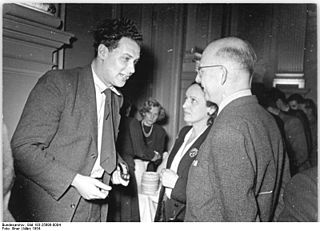
Franz Carl Weiskopf was a German-speaking writer. Born in Prague, then part of Austria-Hungary, he was often referred to as F. C. Weiskopf, he also used the pseudonyms Petr Buk, Pierre Buk and F. W. L. Kovacs. He died in Berlin in 1955.
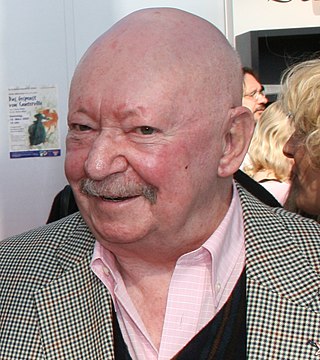
Günter Kunert was a German writer. Based in East Berlin, he published poetry from 1947, supported by Bertold Brecht. After he had signed a petition against the deprivation of the citizenship of Wolf Biermann in 1976, he lost his SED membership, and moved to the West two years later. He is regarded as a versatile German writer who wrote short stories, essays, autobiographical works, film scripts and novels. He received international honorary doctorates and awards.

Wolfgang Kraushaar is a political scientist and historian. After a residency at the Hamburger Institut für Sozialforschung from the 1980s until 2015. In 2015 he continued his research at the Hamburg Foundation for the Promotion of Science and Culture also in Hamburg, Germany.

Reimar Oltmanns is a well-known journalist and author in Germany.
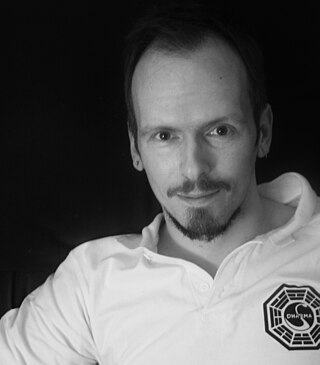
Dietmar Dath is a German author, journalist and translator.
Imanuel Geiss was a German historian.

René Schickele was a German-French writer, essayist and translator.

Volker Weidermann is a German writer and literary critic. He currently works for Frankfurter Allgemeine Zeitung as the literary director and editor of the newspaper's Sunday edition. In 2015, he changed to Der Spiegel.

Helmut Müller-Enbergs is a German political scientist who has written extensively on the Stasi and related aspects of the German Democratic Republic's history.
Klaus Bittermann, also known under the pseudonym of Artur Cravan, is a German author and publisher.
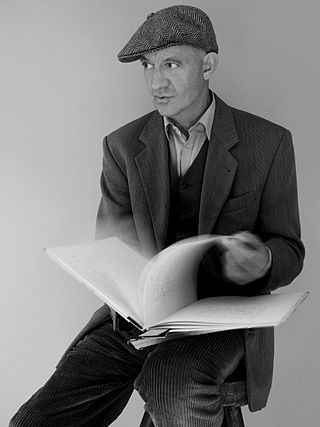
Natias Neutert is a German artist, author, poet, orator, and translator who lives in Hamburg and Berlin.
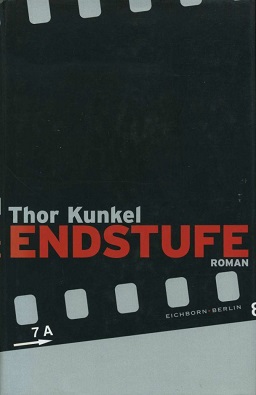
Endstufe is a 2004 novel by the German writer Thor Kunkel. Set in a hedonistic version of the Third Reich, it follows a biologist who works for the SS where he oversees the secret production of pornographic films.

Kerstin Griese is a German politician of the Social Democratic Party (SPD) who has been serving as a member of the German Bundestag since 2000.

Silvia Bovenschen was a German feminist literary critic, author and essayist.

Stefan Weidner is a German scholar of Islamic cultures, writer, and translator. Due to his contributions to the reception of Arabic and other Middle Eastern literatures, the German scholar of Modern Oriental Studies Stefan Wild described him as a "leading mediator of Middle Eastern poetry and prose into German".

Eduard Adolf Daelen was a German painter and writer. For some of his writings he used the pseudonyms Ursus teutonicus, Angelo Dämon, Edu Daelen-Bachem and Michel Bär. He became known above all for the first biography of Wilhelm Busch, which he wrote in 1886.
Pieke Biermann is a German crime writer, literary translator and journalist. She is the winner of the 2020 Leipzig Book Fair Translator's Prize. In the 1970s and '80s, she was an activist in the Berlin women's movement.
References
- ↑ "Regisseur Oskar Roehler und Autor Thor Kunkel über "Subs"". Archived from the original on 2013-11-14.
- ↑ Martin Walser (2001-04-25). "walser über kunkel – Chemielyriker". Taz. Die Tageszeitung.
- ↑ Melanie Amann (2017), "Wahlwerbung – Der Skandalautor und die AfD", Der Spiegel (in German), no. 25, retrieved 2019-09-18
- ↑ dpa: Horror statt Ferienidylle – „Porter's Paradise" uraufgeführt. In: Hamburger Morgenpost. 17 January 2002, retrieved 24 June 2017.
- 1 2 Harding, Luke (12 February 2004). "Porn und Drang". The Guardian. Retrieved 7 May 2024.
- ↑ Iris Radisch: Roman: Ach, du Eisen-Pimmel. In: Zeit Online. 15 April 2004, retrieved 24 June 2017.
- ↑ Volker Weidermann: Glitzernder Kosmos: Thor Kunkels Waffenroman über das Ende der 70er Jahre. In: Frankfurter Allgemeine Zeitung. 14 September 2008, retrieved 24 June 2017.
- ↑ Elias Kreuzmair: Roman „Schaumschwestern": Wünsche älterer Männer. taz, 6 August 2010, retrieved 24 June 2017.
- ↑ Christian Schachinger: Neue Sklaven braucht das Land. derStandard.at, 3 June 2011, retrieved 24 June 2017.
- ↑ Literatur: Sklaven gesucht. In: Der Spiegel. 50/2011, 12 December 2011, S. 124, retrieved 24 June 2017.
- ↑ Ed Meza: Germany's Syrreal Jumps Into Genre Game With Sci-Fi 'Sum1'. Variety, 7 April 2015, retrieved 24 June 2017.
- ↑ "Thor Kunkel – Mir blüht ein stiller Garten". Tessin Tourismus. 2016. Archived from the original on 2016-06-06.
- ↑ Marius Meller: Deutschland, einig Pornoland. In: Der Tagesspiegel, 15 April 2004, retrieved 28 June 2017.
- ↑ Volker Weidermann: Die Nackten und die Toten. In: Frankfurter Allgemeine Sonntagszeitung, 2 February 2004, retrieved 28 June 2017.
- ↑ Richard Kämmerlings (2004-04-03). "Ein Ekelreigen – Keine Geschmackssache: Thor Kunkels Roman "Endstufe"". Frankfurter Allgemeine Zeitung via buecher.de. Archived from the original on 2007-09-30. Retrieved 2017-06-28.
- ↑ "Mercedes-Benz GLA-Klasse: Thor Kunkel – der Autor des GLA Hörbuch Abenteuers". Daimler. Retrieved 2018-03-17.
- ↑ Occupy the Feuilletons! at the Wayback Machine (archived 2015-11-20) Titel-Kulturmagazin, 30 November 2011.
- ↑ Schicksalsmächtige Klubmoral. Titel-Kulturmagazin, 26 August 2013.
- ↑ Helden fürs Geld . at the Wayback Machine (archived 2015-11-20) Titel-Kulturmagazin, 1 February 2012.